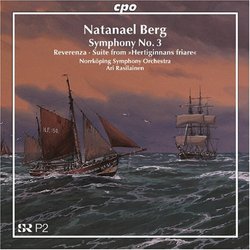| All Artists: Berg, Norrkoping So, Rasilainen Title: Symphony No 3 Forces / Reverenza / Suite Members Wishing: 0 Total Copies: 0 Label: Cpo Records Original Release Date: 1/1/2010 Re-Release Date: 3/30/2010 Genre: Classical Style: Symphonies Number of Discs: 1 SwapaCD Credits: 1 UPC: 761203732524 |
Search - Berg, Norrkoping So, Rasilainen :: Symphony No 3 Forces / Reverenza / Suite
 | Berg, Norrkoping So, Rasilainen Symphony No 3 Forces / Reverenza / Suite Genre: Classical
|
Larger Image |
CD Details |
CD ReviewsA Minor Swedish Master J Scott Morrison | Middlebury VT, USA | 05/20/2010 (4 out of 5 stars) "The cpo label has made a real effort to bring us recordings of music by second-tier composers who were working in the latter part of the 19th century and the first half of the 20th. Among them have been recordings by such Swedish composers as Rangström and Atterberg, among others, who were roughly contemporaries of the composer whose music appears on this CD. Natanael Berg (1879-1957) was not a professional composer; he made his living as a military veterinarian who took care of the Swedish king's horses. But he was intensely musical, having grown up in a very musical family, and he composed from an early age. His music is sometimes compared with that of Richard Strauss, but it is not nearly as chromatic nor contrapuntal. He did meet Strauss in 1909 at a time when he wasn't sure he should keep composing, and he showed him some of his works. Strauss is reported to have said, 'Ganz nette Sachen, setzen Sie ruhig fort.' ('Very nice stuff, keep at it.') I reviewed an earlier issue in this series which had his First and Second Symphonies Natanael Berg: Symphonies Nos. 1 & 2, having been rather taken with it. Now we get the Third Symphony plus a small tone poem ('Reverenza') and a suite from the ballet 'Hertiginnans friare' ('The Duchess's Suitors').
'Reverenza' came at the end of Berg's life and was written for a celebration honoring the eightieth birthday of an old friend, the noted Swedish conductor Armas Järnefelt. It is a six-minute work whose main mood is one of pomp and celebration. It is receiving its first recording here. It is craftily made but not a major work. The 22-minute Suite from 'Hertiginnans friare' (1922) is from a ballet in which a duchess tries to find out which of her four suitors truly loves her for herself and not her title and money, so she disguises herself as a gypsy. The opening section, 'Zigenardans' ('Gypsy Dance') is her opening gambit. Then follow a Serenade, Tarantella, Sevillana and Polonaise each featuring one of her suitors. These sections, then, are elaborated dances which use the typical melodies and rhythms suggested by their titles. The music is brilliantly orchestrated, floridly melodic and rhythmic. This is beautiful tonal, romantic music that never strays from its origins as ballet music. The 24-minute Symphony No. 3 (1914/1930) is subtitled 'Makter' ('Forces') and is in only two movements. The first movement, subtitled 'Mannen' ('Men'), was originally intended to stand by itself as a tone poem and was premièred as such. But then Berg met 'My little woman, Elsie!', married her in 1930 and later that decade finished the second movement subtitled 'Kvinnan' ('Women'). The work depicts in music the characteristic 'powers' of each of the sexes. Men are shown as strong, aggressive, sometimes warlike or bullheaded, striving. Women are shown to have strong inner control, tenderness, the ability to encompass all and be victorious. Whether Berg succeeds in what he set out to do is open to question, but this is lovely music, again reminiscent of Strauss (or perhaps more aptly, Reznicek). The conductor, as in the earlier Berg CD, is Ari Rasilainen, who seems to be making a career of resurrecting neglected late Romantic-era music, e.g. Sinding: Symphonies Nos. 1 & 2, Ernst Boehe: Aus Odysseus' Fahrten, Symphonic Poems Vol. 2, Kurt Atterberg: The Symphonies (Box Set). The orchestra is the fine, if perhaps second-tier Norrköping Symphony Orchestra. Recorded sound is good. Total time, at 53 minutes, is a tad short. Scott Morrison " |

 Track Listings (8) - Disc #1
Track Listings (8) - Disc #1